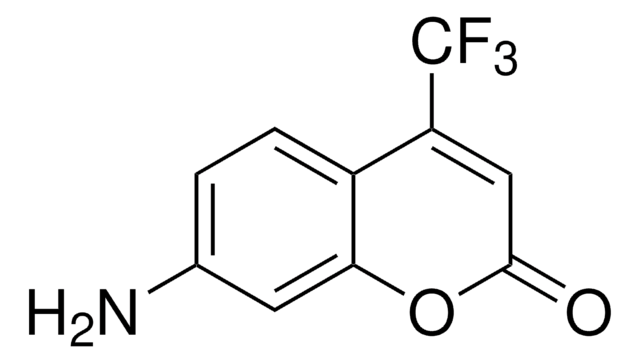T3165
7-Methoxy-4-(trifluoromethyl)coumarin
≥99% (TLC)
Synonym(s):
Methyl 4-(trifluoromethyl)umbelliferyl ether
About This Item
Recommended Products
Assay
≥99% (TLC)
form
powder
solubility
acetone: 50 mg/mL, clear, colorless to faintly yellow
fluorescence
λex 333 nm; λem 416 nm in methanol
SMILES string
COc1ccc2c(OC(=O)C=C2C(F)(F)F)c1
InChI
1S/C11H7F3O3/c1-16-6-2-3-7-8(11(12,13)14)5-10(15)17-9(7)4-6/h2-5H,1H3
InChI key
HAZHUELNIGDYQH-UHFFFAOYSA-N
Looking for similar products? Visit Product Comparison Guide
Application
Biochem/physiol Actions
Signal Word
Warning
Hazard Statements
Precautionary Statements
Hazard Classifications
Eye Irrit. 2 - Skin Irrit. 2 - STOT SE 3
Target Organs
Respiratory system
Storage Class Code
11 - Combustible Solids
WGK
WGK 3
Personal Protective Equipment
Certificates of Analysis (COA)
Search for Certificates of Analysis (COA) by entering the products Lot/Batch Number. Lot and Batch Numbers can be found on a product’s label following the words ‘Lot’ or ‘Batch’.
Already Own This Product?
Find documentation for the products that you have recently purchased in the Document Library.
Our team of scientists has experience in all areas of research including Life Science, Material Science, Chemical Synthesis, Chromatography, Analytical and many others.
Contact Technical Service









